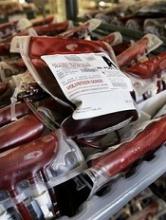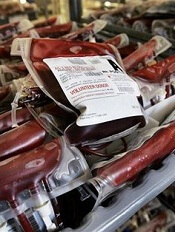User login
Researchers have developed software that could enable more precise matching for blood transfusions, according to a paper published in The Lancet Haematology.
The software, bloodTyper, can automatically type red blood cell (RBC) and platelet antigens from whole-genome sequencing (WGS) data.
In repeated tests, bloodTyper produced results that were more than 99% concordant with results from conventional antigen typing methods.
The researchers said these results suggest bloodTyper could improve transfusion typing.
“[W]ith current technology, it is not cost-effective to do blood typing for all antigens,” said study author William Lane, MD, PhD, of Brigham and Women’s Hospital in Boston, Massachusetts.
“But the algorithm we have developed can be applied to type everyone for all relevant blood groups at a low cost once sequencing is obtained.”
Dr Lane and his colleagues first tested bloodTyper using data from the MedSeq Project—the first randomized trial of WGS in healthy adults.
Blood samples from 110 subjects underwent DNA isolation, WGS, and RBC and platelet antigen typing with bloodTyper. Samples also underwent single nucleotide polymorphism (SNP) array typing and serological typing.
The researchers compared results with these typing methods and found that bloodTyper was 99.5% concordant with serological and SNP typing across the first 20 MedSeq genomes.
Further refinement of bloodTyper enabled improved concordance for the remaining 90 genomes. The researchers said bloodTyper was 99.8% concordant with serological and SNP typing methods for 38 RBC and 22 platelet antigens (encoded by 17 RBC and 6 platelet genes).
The team made additional modifications to bloodTyper and tested it with 200 genomes from the INTERVAL study. This time, bloodTyper was 99.2% concordant with serological methods for typing of 21 RBC antigens encoded by 14 genes.
When the researchers adjusted for the lower depth of coverage for INTERVAL genomes compared to MedSeq genomes (15× and 30×, respectively), they observed 99.9% concordance between serological typing and bloodTyper.
“This approach has the potential to be one of the first routine clinical uses of genomics for medical care for patients needing blood transfusion,” said study author Connie M. Westhoff, PhD, of the New York Blood Center in New York, New York.
“It could prevent serious or even fatal complications because, once patients are sensitized, they have a life-long risk of hemolytic transfusion reactions if blood transfusion is needed in an emergency.”
Researchers have developed software that could enable more precise matching for blood transfusions, according to a paper published in The Lancet Haematology.
The software, bloodTyper, can automatically type red blood cell (RBC) and platelet antigens from whole-genome sequencing (WGS) data.
In repeated tests, bloodTyper produced results that were more than 99% concordant with results from conventional antigen typing methods.
The researchers said these results suggest bloodTyper could improve transfusion typing.
“[W]ith current technology, it is not cost-effective to do blood typing for all antigens,” said study author William Lane, MD, PhD, of Brigham and Women’s Hospital in Boston, Massachusetts.
“But the algorithm we have developed can be applied to type everyone for all relevant blood groups at a low cost once sequencing is obtained.”
Dr Lane and his colleagues first tested bloodTyper using data from the MedSeq Project—the first randomized trial of WGS in healthy adults.
Blood samples from 110 subjects underwent DNA isolation, WGS, and RBC and platelet antigen typing with bloodTyper. Samples also underwent single nucleotide polymorphism (SNP) array typing and serological typing.
The researchers compared results with these typing methods and found that bloodTyper was 99.5% concordant with serological and SNP typing across the first 20 MedSeq genomes.
Further refinement of bloodTyper enabled improved concordance for the remaining 90 genomes. The researchers said bloodTyper was 99.8% concordant with serological and SNP typing methods for 38 RBC and 22 platelet antigens (encoded by 17 RBC and 6 platelet genes).
The team made additional modifications to bloodTyper and tested it with 200 genomes from the INTERVAL study. This time, bloodTyper was 99.2% concordant with serological methods for typing of 21 RBC antigens encoded by 14 genes.
When the researchers adjusted for the lower depth of coverage for INTERVAL genomes compared to MedSeq genomes (15× and 30×, respectively), they observed 99.9% concordance between serological typing and bloodTyper.
“This approach has the potential to be one of the first routine clinical uses of genomics for medical care for patients needing blood transfusion,” said study author Connie M. Westhoff, PhD, of the New York Blood Center in New York, New York.
“It could prevent serious or even fatal complications because, once patients are sensitized, they have a life-long risk of hemolytic transfusion reactions if blood transfusion is needed in an emergency.”
Researchers have developed software that could enable more precise matching for blood transfusions, according to a paper published in The Lancet Haematology.
The software, bloodTyper, can automatically type red blood cell (RBC) and platelet antigens from whole-genome sequencing (WGS) data.
In repeated tests, bloodTyper produced results that were more than 99% concordant with results from conventional antigen typing methods.
The researchers said these results suggest bloodTyper could improve transfusion typing.
“[W]ith current technology, it is not cost-effective to do blood typing for all antigens,” said study author William Lane, MD, PhD, of Brigham and Women’s Hospital in Boston, Massachusetts.
“But the algorithm we have developed can be applied to type everyone for all relevant blood groups at a low cost once sequencing is obtained.”
Dr Lane and his colleagues first tested bloodTyper using data from the MedSeq Project—the first randomized trial of WGS in healthy adults.
Blood samples from 110 subjects underwent DNA isolation, WGS, and RBC and platelet antigen typing with bloodTyper. Samples also underwent single nucleotide polymorphism (SNP) array typing and serological typing.
The researchers compared results with these typing methods and found that bloodTyper was 99.5% concordant with serological and SNP typing across the first 20 MedSeq genomes.
Further refinement of bloodTyper enabled improved concordance for the remaining 90 genomes. The researchers said bloodTyper was 99.8% concordant with serological and SNP typing methods for 38 RBC and 22 platelet antigens (encoded by 17 RBC and 6 platelet genes).
The team made additional modifications to bloodTyper and tested it with 200 genomes from the INTERVAL study. This time, bloodTyper was 99.2% concordant with serological methods for typing of 21 RBC antigens encoded by 14 genes.
When the researchers adjusted for the lower depth of coverage for INTERVAL genomes compared to MedSeq genomes (15× and 30×, respectively), they observed 99.9% concordance between serological typing and bloodTyper.
“This approach has the potential to be one of the first routine clinical uses of genomics for medical care for patients needing blood transfusion,” said study author Connie M. Westhoff, PhD, of the New York Blood Center in New York, New York.
“It could prevent serious or even fatal complications because, once patients are sensitized, they have a life-long risk of hemolytic transfusion reactions if blood transfusion is needed in an emergency.”

